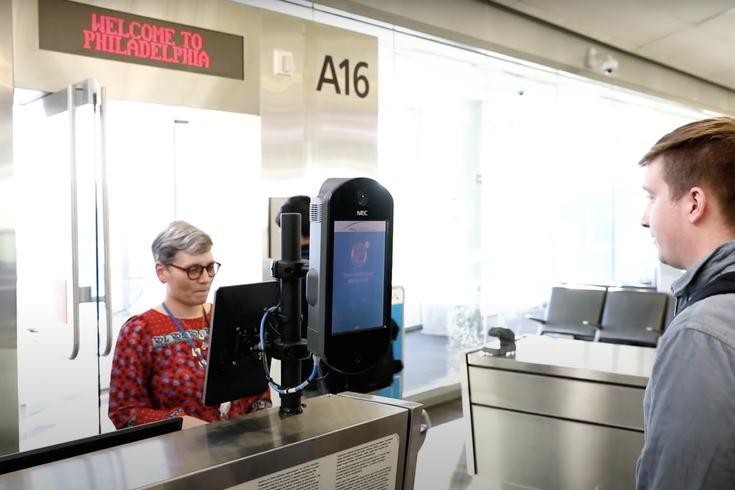
January 05, 2023
 Courtesy/PHL Airport/ Youtube
Courtesy/PHL Airport/ Youtube
Philadelphia's airport is currently installing facial biometric technology at 25 of its boarding gates for travelers on international flights. The scanners are added security checkpoints that will match live photos to the ones provided on passports. Currently, 10 gates have them.
Philadelphia International Airport is in the process of adding a new security feature for international travelers.
Facial biometric technology is coming to 25 gates in Terminal A East and A West to help U.S. Customs and Border Protection verify the identities of passengers flying overseas.
The scanners will take live photos of travelers and compare them to photos from their government-issued passports or visas.
The new security measure will be rolled out in three phases. The initial phase spanning 10 gates (A7, A8, A9, A10, A11, A12, A13, A15, A16, A17) has already begun. The airport says another 10 gates will open with the tech later this month or in February, and the remaining five gates will be equipped with facial scanning by April.
PHL Chief Operating Officer Keith Brune said that security is the airport's top priority, and the addition of the biometric face scanners will make improve safety for its international travelers.
"We are excited to move forward with the installation of biometric technology at PHL. This system will make the screening process more efficient for everyone and is especially important as international travel continues to grow post-pandemic," Brune said.
The technology will be provided through SITA, the air transport industry's go-to resource for information technology.
In collaboration with U.S. Customs and Border Protection, TSA will collect scans of all travelers exiting the U.S. The agency will be able to access the scans and travelers' identities at all security checkpoints and also at flight check-ins, bag check-ins and boarding.
Philadelphia's technology will also be accessible to travelers as a part of the Simplified Arrival process to streamline the entry process into the airport.
TSA has begun testing the technology at 16 other airports, although San Francisco has banned the facial recognition software.
Customers wary of the technology are not required to participate, and can contact customs or an airport representative to get a manual document check instead of a face scan. Once your identity verification is processed, the photos are discarded within 12 hours.
Because the implementation is in its early stages, little is known about the technology, and many are apprehensive about using a feature that could breach their privacy.
The facial recognition software was piloted at the Washington D.C. Reagan International Airport in 2020 during the COVID-19 pandemic.
The Washington Post reports that while TSA representatives call the technology a security enhancement, there is not enough quantitative data on its accuracy or how often it misidentifies people. That data will likely be released by 2024, when the security administration plans to pitch facial recognition to all U.S. airports.
Albert Fox Cahn, the executive director of the Surveillance Technology Oversight Project, told the Post he worries the technology may falsely identify Black and brown travelers and other groups who face discrimination through identification errors.
TSA does not use facial recognition software for issues pertaining to law enforcement, officials said.